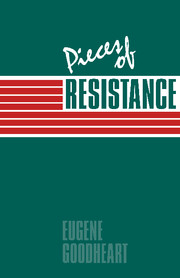Book contents
- Frontmatter
- Contents
- Preface
- Acknowledgments
- Autobiographical
- Part I Critics and criticism
- Part II Contemporary culture in conflict
- Part III Writing in America and elsewhere
- 13 The New Country: Stories from the Yiddish About Life in America
- 14 Three Novels, by Daniel Fuchs
- 15 The demonic charm of Bashevis Singer
- 16 The thirties revisited: Meyer Liben's Justice Hunger and Nine Stories
- 17 Bernard Malamud's A New Life
- 18 Ralph Ellison's Shadow and Act
- 19 William Styron's The Confessions of Nat Turner
- 20 Donald Barthelme's The Dead Father
- 21 Raymond Carver's Cathedral
- 22 Saul Bellow's Him with His Foot in His Mouth and Other Stories
- 23 The claustral world of Nadine Gordimer
13 - The New Country: Stories from the Yiddish About Life in America
Published online by Cambridge University Press: 05 August 2012
- Frontmatter
- Contents
- Preface
- Acknowledgments
- Autobiographical
- Part I Critics and criticism
- Part II Contemporary culture in conflict
- Part III Writing in America and elsewhere
- 13 The New Country: Stories from the Yiddish About Life in America
- 14 Three Novels, by Daniel Fuchs
- 15 The demonic charm of Bashevis Singer
- 16 The thirties revisited: Meyer Liben's Justice Hunger and Nine Stories
- 17 Bernard Malamud's A New Life
- 18 Ralph Ellison's Shadow and Act
- 19 William Styron's The Confessions of Nat Turner
- 20 Donald Barthelme's The Dead Father
- 21 Raymond Carver's Cathedral
- 22 Saul Bellow's Him with His Foot in His Mouth and Other Stories
- 23 The claustral world of Nadine Gordimer
Summary
My reaction to these “stories from the Yiddish about life in America” is complicated by a fact of my adolescence. I had read some of these stories and others like them in a Yiddish schule, and they became part of the militancy with which I – and others who shared my experience – confronted the world as a Jew and a “progressive.” (Several of the writers anthologized here, in fact, taught in these schules.) When the stories weren't merely exercises in reading they were lessons in right action and right feeling, and as one might expect, the lessons were clear and unambiguous. We shared the exploited sweat-shop worker's indignation and his hope for a better world. If we had never experienced the terrors of immigrant loneliness and poverty, we came to know them intimately, partly through our reading of the stories and, of course, partly through our parents. I suspect that these stories satisfied the adult reader in much the same way. They consoled him in his suffering, encouraged his indignation, relieved him somewhat of his bewilderment in the New Country either by a nostalgic evocation of the Old Country or an apocalyptic vision of an earthly paradise.
The characteristic voice of the Yiddish writer in America – and we hear it in this collection – was that of a sympathetic friend or brother who had suffered like his readers. He too had lived in a tenement or worked in a sweat shop.
- Type
- Chapter
- Information
- Pieces of Resistance , pp. 121 - 124Publisher: Cambridge University PressPrint publication year: 1987



